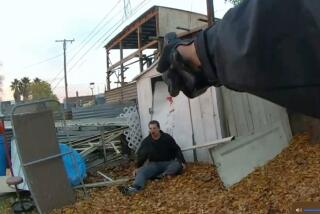$5.5-Million Settlement Offered to Man Paralyzed in Police Shooting : Courts: Record jury award would be reduced in exchange for the city’s dropping of appeal. The council will vote on the agreement.
- Share via
An assistant city attorney said Tuesday he has recommended a $5.5-million settlement in a case involving a former Coliseum groundskeeper who was shot by an off-duty Los Angeles police officer in 1987 and left a paraplegic.
In April, Adelaido Altamirano, 47, was awarded $8.75 million by a Superior Court jury--the largest police-related jury award since the city attorney’s office began keeping such statistics in 1972.
After extensive negotiations, Altamirano and his attorney, R. Samuel Paz, “agreed to take less than the judgment and we agreed to drop our appeal of that judgment,” said Assistant City Atty. Michael K. Fox.
Fox said “economic ramifications” figured heavily in his attempt to quickly reach a settlement--believed to be the largest ever offered in a police-related shooting.
“With interest accumulating at a rate of 7% a year, by the time we got the appeal resolved, if we lost, the city would have had to pay up to $10 million,” Fox said. “The judgment has already accumulated more than $250,000 (in interest) over the past six months.”
The proposed settlement will be considered later this month by the City Council’s Budget and Finance Committee, which has raised questions about the rising cost of police-related litigation in the aftermath of the March 3 beating of motorist Rodney G. King.
City attorney records show that payouts in police lawsuits have climbed from less than $1 million in 1980 to $9.1 million last year, plus interest and fees for plaintiff’s lawyers.
“The Rodney King incident and recent revelations about the Los Angeles County Sheriff’s Department,” Paz said, “have balanced the playing field in courthouses where police are no longer cloaked in an aura of purity.”
In Altamirano’s case, jurors deliberated 2 1/2 days before unanimously returning an $8.75-million judgment, plus $2,500 for violations of his civil rights, $2,500 for assault and battery and $5,000 in punitive damages against Officer Donald Hudson, who shot him.
During the two-week trial, Paz argued that police tried to protect Hudson, a 10-year veteran of the force.
Paz said that Altamirano was walking home on the night of Nov. 16, 1987, when he was accosted by a man with a knife who demanded his wallet.
Altamirano, having been robbed in the area before, was carrying a 9-millimeter semiautomatic pistol for protection. Altamirano pulled the gun out to scare away the would-be assailant, Paz said.
Hudson, who was out of uniform and in his car, saw Altamirano holding the gun. He jumped out of the car, ran after Altamirano and fired three times with his service revolver. One of the bullets pierced Altamirano’s shoulder, hit his spine and went through his right arm.
“Altamirano is paralyzed from his shoulder blade down,” Paz said. “He will never walk again.”
Fox offered a different version of what happened that night in a letter advising City Council members of the proposed settlement.
According to Fox, Hudson told Altamirano in both English and Spanish to drop the gun, but Altamirano kept walking away. Fearing Altamirano was about to escape, Hudson approached the man--who suddenly stopped and turned around.
“Hudson testified that he saw a gun in Altamirano’s hand, and believing he was about to be shot, fired three times,” Fox said in his letter. “Altamirano fell to the ground and was taken into custody.”
During the trial, Altamirano testified that he never heard Hudson identify himself, or an order for him to drop the pistol, which by then he had tucked back into his belt.
There were no witnesses to the shooting, but a woman in a bedroom 75 feet away claimed she heard gunshots, then heard the officer’s demands.
If the settlement is approved by the City Council, Altamirano will receive “substantial monthly payments” to defray medical bills of about $35,000 a year, Paz said.
Altamirano, who lives in a rented bungalow with his mother and two sisters, also hopes to move out of a neighborhood plagued by gangs and drug peddlers, Paz said.
“As an able-bodied person, he could run off burglars and gang members,” Paz said. “In a wheelchair he is defenseless.”
More to Read
Sign up for Essential California
The most important California stories and recommendations in your inbox every morning.
You may occasionally receive promotional content from the Los Angeles Times.














